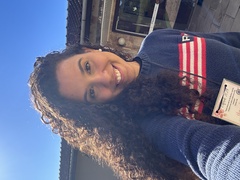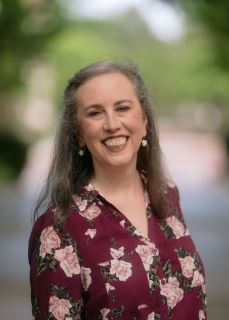We love building relationships. Subscribe to our blog to receive weekly encouragement in your email inbox.
Visit Our Store
Donate
You can also mail checks, made out to IRSM, to:
Iron Rose Sister Ministries
PO Box 1351
Searcy, AR 72145
IRSM is a 501(c)(3), so donations are tax-deductible.
Blog
More blog entries below
 Written by Beliza Kocev, Brazil Coordinator at Iron Rose Sister Ministries
Written by Beliza Kocev, Brazil Coordinator at Iron Rose Sister Ministries
I never liked my name. I wrote other names in all my childhood photo albums. I am not quite sure why this was the case, but I always felt like I had a weird and meaningless name (even in Portuguese, Beliza is not a popular name). No one else had that name, and everyone asked where it came from.
I also never liked my last name. In Brazil, Silva is a very common last name. Today, I recognize that I just wanted to feel special, and having a super common last name went against my desire. Throughout my childhood and early adolescence, I made plans to change my name at the registry office when I turned 18. I made plans to marry a man with a long last name so mine would be “special.”
I did neither.
I continue to be Beliza, and today I like that my name is unusual and that my mother dedicated time and thought to choosing my name (in fact, creating it)! Beliza is a rearrangement of my grandmother's name IZA-BEL -> BEL-IZA). And even when I got married, Silva remained (the registry office did not allow me to remove my last name— only to add my husband's name which, by the way, is not as long as I had imagined, ha-ha).
Whoever has ears, let them hear what the Spirit says to the churches. To the one who is victorious, I will give some of the hidden manna. I will also give that person a white stone with a new name written on it, known only to the one who receives it. (Rev 2:17 NIV)
I will receive a new name— I don't know what it will be yet— but like a father who chooses the name of his children, God will give me a new name, remembering that I am an adopted daughter and a part of His family— a name much more special than Beliza— an eternal name.
In the Scriptures, we see that a name is more than just a combination of letters. It is a representation of the essence of the person who bears it. When we say, “in the name of Jesus,” we are talking about Christ Himself, not just a combination of letters. “And I will do whatever you ask in my name, so that the Father may be glorified in the Son. You may ask me for anything in my name, and I will do it” (Jn 14:13-14).
In addition, giving someone a name was a symbol of the authority one had over that person. Adam named the animals (Ge 2:19), and God had already said that Adam would rule over them (Ge 1:26-28). Joseph and Mary did not choose the name of their son— it was up to God to decide that He would be called Jesus (Mt 1:21). From time to time, we see God changing someone’s name as a symbol of a new status, as was the case of Abraham (from Abram), Sarah (from Sarai), and Israel (from Jacob).
A new name, a new status, a new identity.
May we have the strength and courage to remain firm in faith and receive our new name and crown: “Everyone who competes in the games goes into strict training. They do it to get a crown that will not last, but we do it to get a crown that will last forever” (1Co 9:25).
I don’t know whether you like your name or not, but knowing that our Father chooses an eternal name for us should make us grateful for His care and affection for us. It should help us remember that there is no greater love than this—to be called children of God. May we keep this in our hearts until the day the words of Revelation 22:4 are fulfilled: “They will see his face, and his name will be on their foreheads.”
 Written by Michelle J. Goff, Founder and Executive Director for Iron Rose Sister Ministries in Arkansas
Written by Michelle J. Goff, Founder and Executive Director for Iron Rose Sister Ministries in Arkansas
A first-century Hebrew legend states that a good disciple is covered in the dust of the Rabbi. He follows his teacher’s steps so closely that he cannot escape the dust kicked up by his sandals.
A wise woman who practices closely following the steps of Jesus (1Pe 2:21) will be covered in the dust of the Rabbi. What will she look like?
- She will love God and seek Him first (Mt 6:33, 22:37).
- She will be known for Christ’s love in her (Jn 13:35).
- She will talk with God at all hours (Lk 6:12).
- She will openly express her feelings to God through prayer (Mt 26:42).
- She will ask for the support of others (Mt 26:37-38).
- She will serve others (Mt 20:28).
- She will be holy: set apart for a purpose (2Pe 1:16).
This is not an exhaustive list. What other characteristics come to mind that a follower of Christ would “pick up” in the dust of the Rabbi?
The more we walk with Him and talk with Him, the more like Christ we will become. Acts 4:13 is one of my favorite verses because it was obvious to others that two simple, ordinary men had been with Jesus.
When they saw the courage of Peter and John and realized that they were unschooled, ordinary men, they were astonished and they took note that these men had been with Jesus. (NIV)
Can you recall a moment in which it was obvious to others that you had been spending time with Jesus?
At the end of a women’s retreat, after a time of worship on Sunday morning, after a Bible class digging deep into the Word, after an intensive time in prayer… any time we can spend in relationship with our Teacher will become the overflow from which we live, act, and speak. Jesus spoke with His Father frequently so that His words would always be an accurate representation of His Father (Jn 12:49).
One Wednesday night, my mom was on the phone with a friend who commented on how exhausted my mom sounded, recognizing how discouraged she was about a situation. “I am tired,” mom admitted, “but I need to go on into the church building. Thanks for your prayers.”
Mom called the friend back after the evening services, and her friend observed, “Wow! You sound like a different person. Are you still tired? I can tell you were truly uplifted by the time with other Christians.”
When we walk in the dust of the Rabbi, we also have the blessing of spending time with others who are “dusty.” None of us walk the Christian walk perfectly. We are practicing. When one falls, another is there to pick us up (Ecc 4:10). And the closer we each follow in the Rabbi’s steps, the deeper we grow in relationship with one another. A wise woman who practices following closely in the steps of the Rabbi will walk with other disciples who are following Jesus.
Connecting to God and one another more deeply, equipping other women to do so… sounds like a great idea for a women’s ministry!
How do you want to grow closer to Jesus, walking in the dust of the Rabbi?
What is a thorn hindering you from following in His steps?
How can you have another Iron Rose Sister encourage or accompany you to “get dusty”? Thank each other for the opportunity to serve as iron sharpening iron as we practice following in the steps of the Rabbi.

